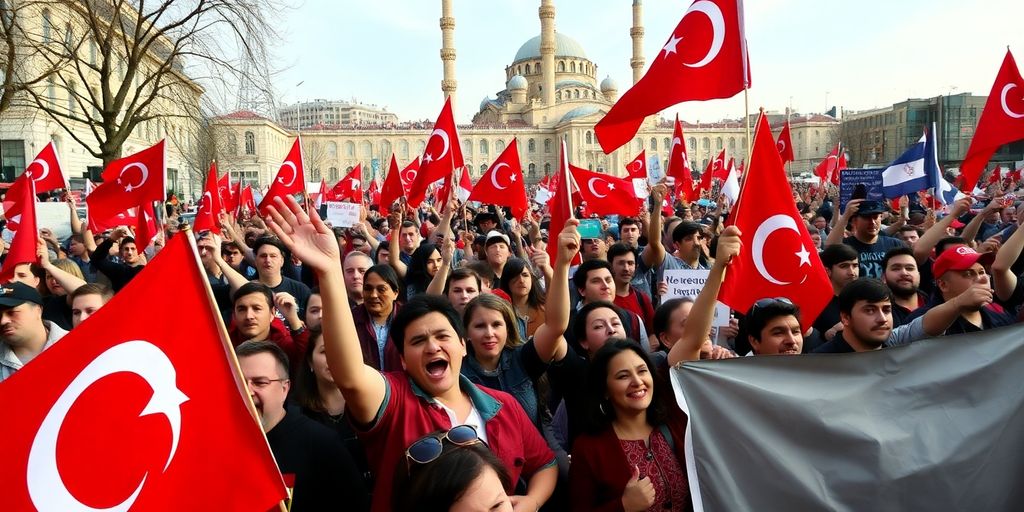In a significant political upheaval, Turkey’s opposition is gaining momentum following the arrest of Istanbul Mayor Ekrem Imamoglu. His detention has sparked widespread protests and a crackdown on dissent, leading to mass trials of nearly 200 individuals, including students and journalists, accused of participating in the demonstrations.
Key Takeaways
- Ekrem Imamoglu, a prominent opposition figure, was arrested on March 19, 2025, on corruption charges.
- His arrest triggered protests across Turkey, leading to the detention of approximately 2,000 people.
- Nearly 200 individuals are currently on trial, facing charges related to the protests.
- Human rights organizations have condemned the trials as politically motivated and lacking substantial evidence.
Background of the Protests
The protests erupted in response to Imamoglu’s arrest, which many view as a politically motivated attempt by President Recep Tayyip Erdogan to eliminate a key rival ahead of the 2028 elections. Imamoglu, a member of the Republican People’s Party (CHP), has been a significant figure in Turkish politics, known for his ability to unite various factions against Erdogan’s ruling party.
The demonstrations have been marked by a diverse coalition of participants, including students, activists, and journalists, all demanding justice and the release of those detained. The protests represent one of the largest challenges to Erdogan’s authority in years, reminiscent of the Gezi Park protests in 2013.
The Trials Begin
On April 18, 2025, the trials commenced in Istanbul, with 189 defendants facing charges ranging from participating in illegal protests to carrying weapons. The court proceedings have been criticized for their rushed nature and lack of evidence. Many of the defendants are first-time protesters, highlighting a resurgence of political activism among Turkey’s youth.
- Charges Faced by Defendants:
- Participating in illegal rallies
- Failing to disperse despite police orders
- Carrying weapons (with vague evidence, such as a rock allegedly held by a protester)
Human Rights Watch has called for the dismissal of these cases, arguing that the charges are politically motivated and lack credible evidence. The organization has noted that the trials serve as a warning against exercising the rights to peaceful protest and free expression.
Public Response and Opposition Unity
Outside the courthouses, supporters of the defendants, including parents and activists, have gathered to demand justice. They argue that the government is using these trials to suppress dissent and maintain control over the political landscape.
The CHP is now seeking to capitalize on the public outrage and unify various opposition factions to challenge Erdogan’s rule. Recent polls indicate that support for the CHP has surged, with some surveys showing them leading Erdogan’s party.
- Current Political Landscape:
- CHP: Approximately 37% support
- Erdogan’s AKP: Approximately 30% support
The opposition’s challenge lies in maintaining this momentum and translating it into electoral success. With the next presidential elections scheduled for 2028, the CHP aims to build a broad coalition that includes pro-Kurdish parties and other political groups.
Conclusion
The arrest of Ekrem Imamoglu has ignited a wave of protests and a renewed sense of political activism in Turkey. As the trials of nearly 200 protesters unfold, the opposition is rallying to challenge Erdogan’s long-standing grip on power. The outcome of these events could significantly shape Turkey’s political future as citizens demand accountability and reform.
Sources
- Nearly 200 students, journalists go on trial in Turkey over Istanbul protests, France 24.
- Turkey begins mass trials following protests over Istanbul mayor’s detention, CNN.
- Dozens of protesters go on trial in Turkey as crackdown continues after arrest of Istanbul’s mayor –
Washington Times, Washington Times. - Turkey’s CHP seeks broad alliance against Erdogan after mayor’s arrest, The Washington Post.






